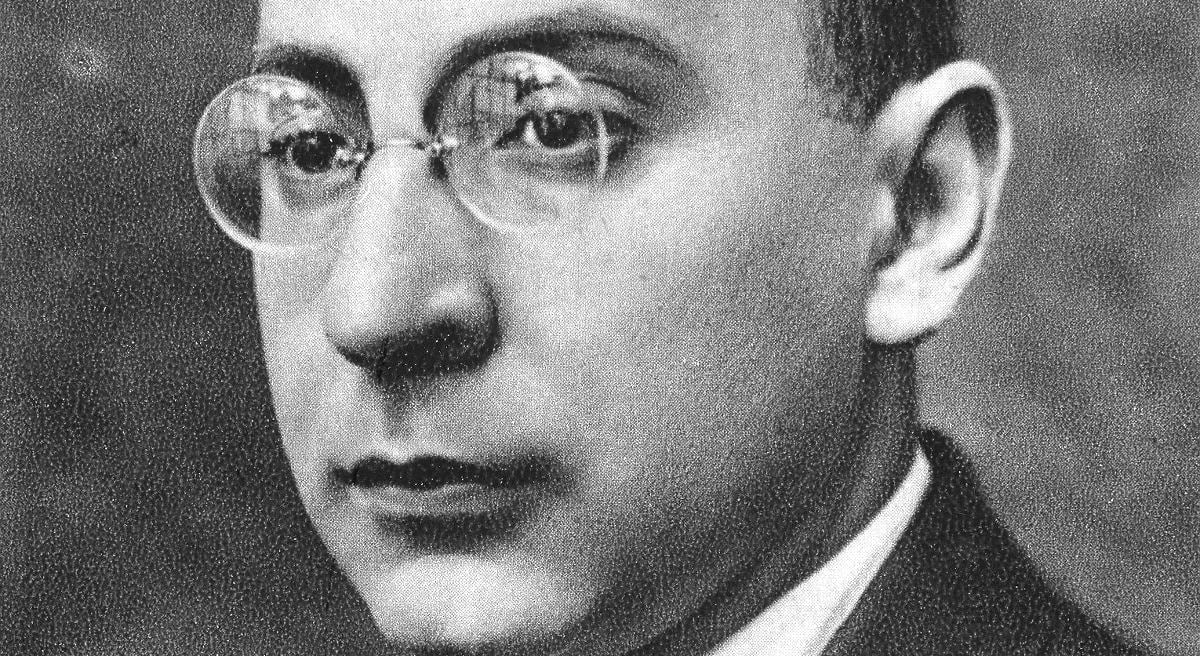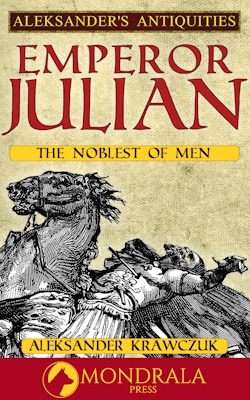A poetic coda closes "Emperor Julian"
"The Apostate" is a Cavafy-inspired 1923 poem by Antoni Slonimski.
7/28/20243 min read


Yesterday I finished translating Aleksander Krawczuk's "Emperor Julian," the last volume of the Christian Trilogy. The book ends with a beautiful poem and translating the poem affected me very profoundly.
The poem, by the Polish poet Antoni Słonimski, was first published 1923, in a collection entitled "Godzina Poezji" (“An Hour of Poetry”). It is a dramatic monologue inspired in part by English poets like Tennyson and in part by the poetry of Cavafy.
A Jew in a Catholic country, the poet probably found special relevance in the question: “Who has the gall to call me a renegade? Who is the traitor here, and who has remained faithful?” But political references to the there and then should not blind us to the poem’s eternal beauty. Note the simile of death as an approaching lion scattering jackals and hyenas before him, the repeating imagery of blinding whiteness, a crime unnamed as a poison concealed in wine, and at the end, how the soliloquy wafts into the realm of otherworldliness because he begins to hallucinate.
THE APOSTATE
(Night. Before the tent. Persian desert.)
Pass me a cup of wine, Procopius.
The wound is less painful now.
I have never seen the sky so starry.
Home stars of Gaul and Rome
How menacing they shine over the desert today.
Stay with me. I would still like to breathe
The coolness of the night.
I’ve always feared the boundless desert sands,
But now, the unreasonable fear has gone.
There is no place for the fears that the imagination breeds,
When I am filled to the bottom of my heart
With the inexorable certainty of imminent death.
Daily cares, petty worries: they are like jackals, vultures or hyenas,
Which, panic-stricken, are frightened away,
When a lion approaches its prey.
They say that a man before he dies, sees
The story of his life in a desperate abbreviation.
What images does memory bring back to me now?
I can’t see Uncle Constantius’s face.
But how close and painful I see
The bodies of my brothers murdered;
White, as if all their blood had drained
Into their bedding, all black with stains.
I escaped death when our faithful slave
Hid Gallus and me behind a curtain.
Now again, I see the whiteness—
It is the whiteness of the marble
Stairs of the house where
The Bishop of Arethusa gave us shelter.
He first educated me in Christianity,
He taught me humility. He praised poverty,
Eagerly accepting at the bishop’s court
The tithe prescribed by law:
Sheep, oil, grain, wax, and wine,
Brought down in cargo ships,
The produce of rich lands unnamed,
Of winter roses and spring snows.
Poverty! I know it from the churches of Antioch,
From the golden basilicas of Constantinople.
He praised the slaughter of Wallentrojans,
The murder of Aremus and of the Dux of Egypt,
Flogged to death with eunuchs’ whips.
Sinless murders because in the confessional
The robber gave absolution to the murderer
And always found some obscure verse,
Which gave justification to a new evaluation
Of a crime committed for revenge or profit.
He said to love our enemies.
To love one’s enemies? How do we love them?
What then is left for friends? Is it—hatred?
Is that all that feelings are worth?
As a child, I was commanded
To pray to ugliness and deformity,
When painted puppets were placed
On the pedestals of the ancient gods,
Figures of saints with plaster faces
Deformed by the ordeal they had suffered.
Was I to lose my youthful years
In the dark vestibule of a closed temple,
Renounce light, lost without any sense of
What death and the hereafter bring?
Or was I to choose the uncontrollable
Lust for pleasure that sorrow awakens?
I chose the fate of a soldier. Your fate.
For it is a man’s business to fight iniquity.
To defend honor. A crime unnamed
Is like a poison concealed in wine.
Who has the gall to call me a renegade?
Who is the traitor here, and who has remained faithful?
Where is all that in which I willingly believed?
O Eusebius, dear Procopius,
Today, in the hour of settling accounts with life,
I do not regret the struggle, and
I do not regret the defeat,
But fear consumes me, whether I have not overlooked,
I have not missed something more difficult,
Something beyond human nature,
Above the vices of the animal herd.
A volatile matter, like rays
From unknown stars falling upon us.
Again, I see pure white,
All the swirling colors merging into one.
Everything I’ve believed in, everything I’ve hated,
Warps somehow in this final moment.
The sequence of events strangely shortens,
And the thoughts which had accompanied the actions,
Now stand alone, as if on a page,
Some among enemies, others among friends.
From the ranks of the old days of my life
Some depart, grow, and stand
At the head of the defeated army of the days of my life.
Antoni Slonimski (1895-1976) about the time of the publication of THE APOSTATE
Aleksander's Antiquities
Explore antiquity through Aleksander Krawczuk's captivating lens.
CONTACT
NEWS
a.krawczuk@mondrala.com
+352691210278
© 2025. All rights reserved.




